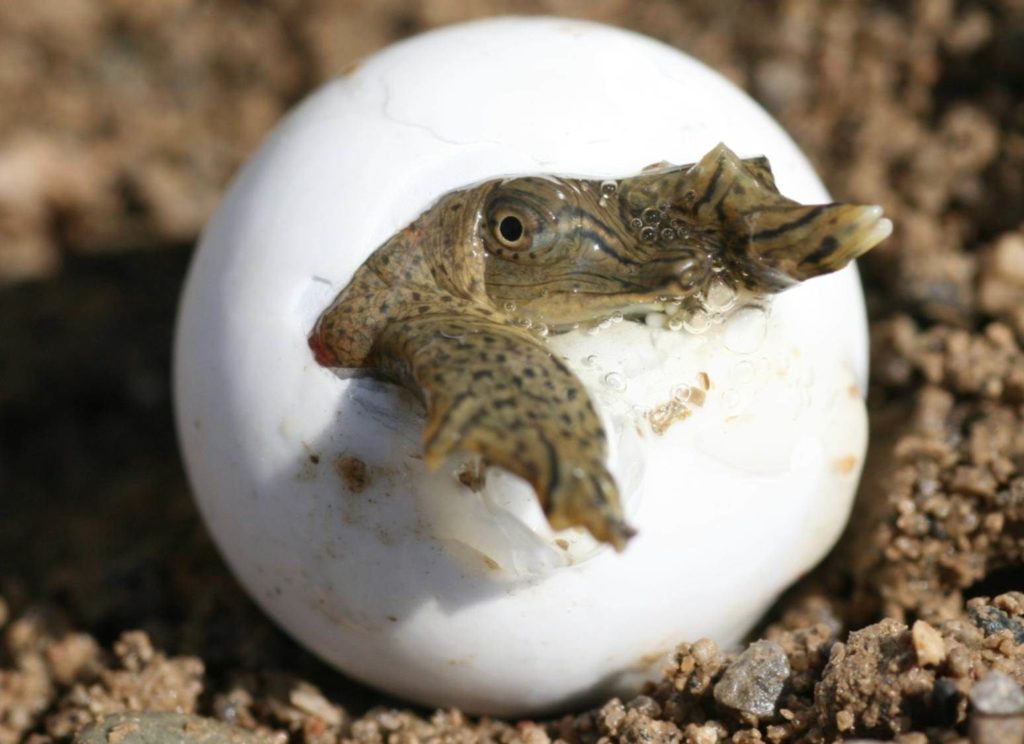Ontario Nature Blog
Receive email alerts about breaking conservation
and environmental news.
© Lora Denis
Spiny softshell turtle © Scott Gillingwater
Part 2 of a 3 part blog series about the Province’s failure to uphold strong protections for our most vulnerable plants and animals.
What moves more slowly than a turtle? The Ontario government when it comes to producing a recovery strategy for the spiny softshell. This threatened turtle is one of over 40 at-risk species for which recovery strategies have long been delayed, in breach of legal requirements.
Ontario’s Endangered Species Act, 2007 (ESA) requires the government to develop recovery strategies according to strict, legally-binding deadlines: within one year of being listed for those classified as endangered, and within two years for those classified as threatened. But, for the spiny softshell and dozens of others, the recovery strategies are more than three years overdue.
Why does this matter? Let’s take a closer look at the spiny softshell. The Committee on the Status of Endangered Wildlife in Canada first listed this turtle as threatened in 1991. Twenty-five years ago! Since then it has suffered declines of up to 50 percent in Ontario and now numbers only about 800 – 1000 individuals in the province. Primary threats include habitat loss and degradation (due to shoreline development, riverbank stabilization, dams, etc.), poaching and recreational activity (collisions with motorboats, fishing by-catch).
Steep decline. Multiple threats. The need for action, at long last, should be obvious. Yet, for the spiny softshell and other species for which recovery strategies are overdue, the government asserts: “The delay in the preparation of these recovery strategies will not jeopardize the survival of these species in Ontario.”
Really? Recovery strategies set out and prioritize the actions needed to reverse the declines of our most vulnerable species. Under the ESA, they also trigger the development of government response statements, outlining the government’s commitments to action, which must be prepared within nine months of the release of a recovery strategy.

In May 2013 and again in June 2016, the Province stated that additional time was needed for the recovery strategy “to allow for cooperation with federal agencies.” It provided no timelines for completion (despite the legal requirement to do so) and no commitment to adopt the federally-led strategy once completed.
The timing is certainly interesting: Environment Canada released its proposed recovery strategy for spiny softshell, required under federal legislation, in March 2016. Dare we hope that the Province will quickly move to adopt it and prepare the government response statement according to the legislated nine-month deadline? In that case the spiny softshell would be much luckier than the dozens of other species (including the likes of little brown bat, American ginseng and cerulean warbler) still stuck in limbo.

Proposed 413 Route, Old School Road with farm and escarpment view © Noah Cole
Other turtle species are at risk too in the Thames River, not only from the unacceptable current levels of chemical and biological pollutants in the waters, but also because of a proposed garbage dump which will inevitably leak leachate (a chemical soup of contaminants from industrial, commercial, institutions and residential garbage as well as “excess” soil) into the watershed.
That proposal needs to be stopped for human and environmental health reasons. The Ministry of the Environment is working at a turtle’s pace on that environmental assessment despite the fact that 5 scientists have already provided their evaluation of the proposal and declared it a non-starter.
Why is tax payers money used to fund a Ministry of Environment and Climate Change? It doesn’t function to protect our environment and all creatures that live within it – including humans. Why doesn’t Ontario’s government act on the behalf of Ontarians? These are the fundamental questions we all need to ask ourselves.
I am sure the MECC would love to be doing more. However, Ontarians, as a group, are less passionate about protecting our environment than is Karen, and myself for that matter. Our government could go all out and do the right thing but if it gets ahead of electorate opinion all their good work will be for naught when they are kicked out in 2018. Already our government is pushing the boundaries and kudos to them for that.